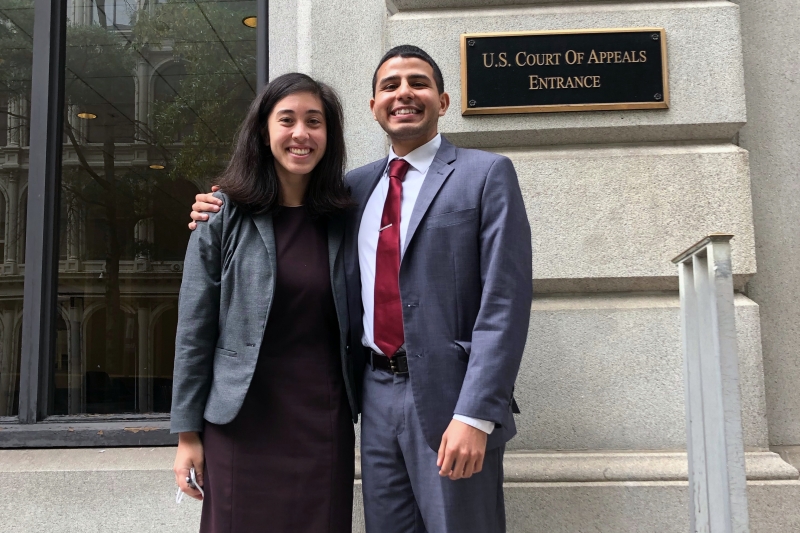Law Students Argue Case in 4th Circuit Court of Appeals Sica Matsuda ‘23L and Brian Warren ‘23L were assigned the case as part of their work with the school’s Criminal Justice Clinic.
Two third year law students at Washington and Lee University School of Law argued a case this month before the U.S. Court of Appeals for the Fourth Circuit. Sica Matsuda ‘23L and Brian Warren ‘23L were assigned the case as part of their work with the school’s Criminal Justice Clinic.
The case itself dates back more than 20 years, when Professor Jonathan Shapiro represented Darwyn Payne at trial on drug charges. Payne was acquitted by the jury of possession with intent to distribute, but convicted of the lesser crime of simple possession of just 9 grams of crack cocaine. At the time, this crime was a felony that carried a mandatory minimum sentence of five years, which Payne served along with two years of supervised release.
Congress later changed the law, first to make this crime a misdemeanor and then passed additional legislation in 2018—the First Step Act—that included a provision to make the misdemeanor charge retroactive. The problem for Payne is that the new statute did not include specific language for someone who has completed his sentence. He has remained a felon, even though someone convicted of the same crime today would likely not even face jail time.
“His status as a felon has prevented him from getting jobs, kept him from traveling to Canada on a family vacation, kept him from getting a professional license, kept him from inheriting his grandfather’s shotgun, and kept him from coaching his son’s AAU basketball team,” says Shapiro.
Matsuda and Warren are the not the first clinic students to work on the case. Katie Moss ‘15L argued the motion in the Eastern District of Virginia following the first change in the law, and Joe Barton ‘20L handled a second motion after the new law was made retroactive. The current effort is an appeal from the denial of Barton’s motion.
Matsuda and Warren learned in September that they would argue the case jointly, and immediately began intense preparation that included extensive legal research and moot arguments. Warren noted that while there are many cases about the First Step Act, there was nothing specifically on point that addressed Payne’s situation.
“Ours was an issue of first impression,” said Warren. “We had to piecemeal cases together to make our argument and try to craft the most persuasive argument tied to the statute.”
Warren took the lead during oral argument on discussing the text and interpretation of the statute in question, while Matsuda discussed the actual purpose of the changes to the original law.
“The judges were reluctant to apply the law to Mr. Payne without an express statement, so we had to be very persuasive about what type of relief to ask for and to make it clear that that pathway is available without creating new law,” said Matsuda.
The students’ experience preparing for and arguing the case is a good example of the “whole building” approach to student success at W&L law. They received help from classmates and more than half dozen faculty to develop and practice their arguments. And when Prof. Shapiro fell ill the day before the court date, Prof. Brandon Hasbrouck stepped in on a day’s notice and completed the necessary paperwork to serve as their supervising attorney, enabling the argument to proceed.
“It was a nice tour down memory lane,” said Matsuda, who was in the same small section with Warren as a 1L. “All these people who had already helped us learn the foundation of the law were now helping us prepare to be actual lawyers for the day before the court—it was just really wonderful.”
For their part, Matsuda and Warren appreciate the layers of institutional history wrapped up in this case and are happy to be “one small part of that interesting journey.” And a skeptical panel from the Fourth Circuit that seemed to be looking for more express guidance from Congress on this matter likely means that journey is not over.
“If we get a bad result from the Fourth Circuit we will take the case to the Supreme Court,” said Shapiro.
 Sica Matsuda ’23L and Brian Warren ’23L
Sica Matsuda ’23L and Brian Warren ’23L
You must be logged in to post a comment.